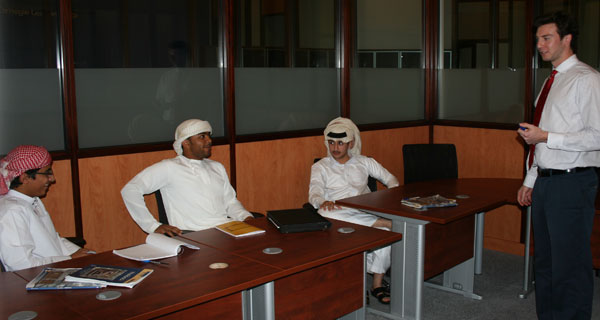As is the case with any foreign culture, there are rules of manner and acts of faux pas that will be inherent anywhere you go – and you most likely will not know about them. Always do your research ahead of time so that you transition smoothly into your EFL teaching position without any major mistakes! Here are some general things to keep in mind, especially when you are teaching in the Middle East:
You (and Everyone in Your Class) Are Right Handed
As far as writing is concerned, this does not apply. However, for introductions and classroom activities, always use your right hand dominantly. The left hand is considered unclean for most Muslims, and they will only eat with their right. You should also extend only your right hand when shaking hands and never touch students’ materials with your left hand (such as passing out papers and the like).
Keep Your Feet on the Ground
Much like Thailand, pointing your foot at someone is considered an insult as the foot is the dirtiest and lowest part of the body. Crossing your legs, as innocent as it seems, inevitably leaves your foot pointing at someone! Keep both your feet on the floor when possible, and avoid activities where students have their feet touching each other. It can be a difficult habit to break, but just remember that it’s better for your legs as a whole to keep them planted on the ground when sitting.
Do Not Take Laughter the Wrong Way
It is normal for Muslims to laugh or chuckle in response to a display of anger or a serious topic. This does not mean they are passing it off as a minor issue or that they will forget about it later. It is more than likely that they have taken it seriously. Essentially, if a student smiles at you after you have scolded them, it does not necessarily mean your effort went in vain. On the same note, if you have a problem you are discussing with your employer or supervisor that you consider to be serious, do not feel defeated if they too laugh or smile in response. Again, it does not mean they are not taking you seriously.
What Time is it?
Watch your clock, because it is a good bet your students will have theirs set to alarm three times a day. Normally class schedules will be built around prayer time, but not always. When prayer is called – you stop everything, regardless of what you are doing. If you are not Muslim, you are not required to engage in prayer but it is a show of great respect to turn and face in the direction of Mecca as your students will. Prayer is called at the same time every day so you will get used to this. Oh, and Sunday is not your day of rest anymore – TGIF will come to have a whole new meaning for you.
For the most part, if you are a female you will be teaching females, and if you are a male you will be teaching males. Co-ed schools are practically non-existent in the region (and very few males work at female schools), so you won’t have to worry too much about the massive amount of rules when it comes to the opposite sex. Do be careful though if you find yourself speaking too freely about your own customs regarding gender. It may be surprising, but even the women will often have a respect for their role in their society, and men will be hard to budge on it.








